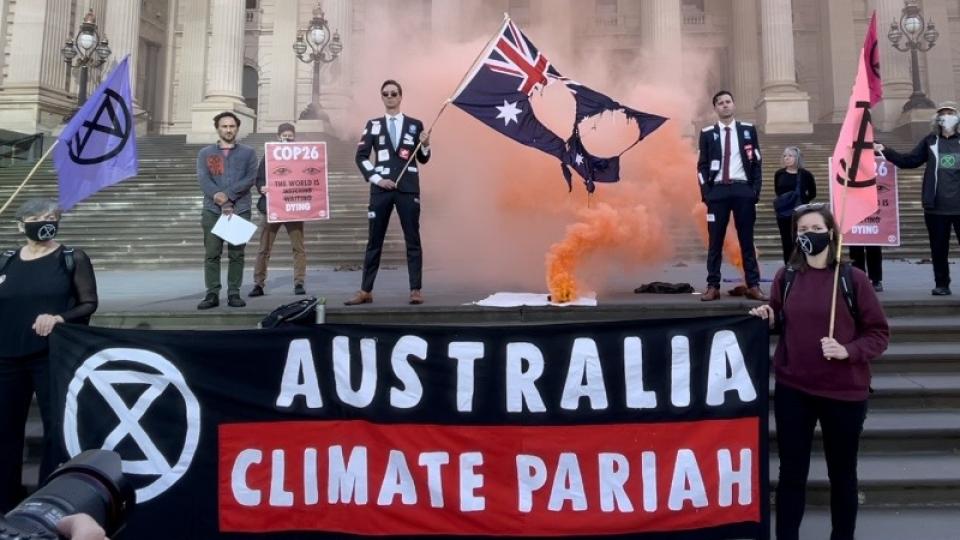Australia is a climate pariah

Prime Minister Scott Morrison made Australia even more of a climate pariah at the United Nations Climate Change Conference (COP26) in Glasgow.
The media may claim the biggest outrage at COP26 was Morrison’s leak of texts between him and French President Emmanuel Macron around the cancellation of the submarine deal, but that is far from the truth.
The disaster is the Coalition’s refusal to join a global pledge to cut methane emissions. The Global Methane Pledge was one of the key actions to come from COP26.
The pledge was announced at a UN General Assembly meeting in September. Over the course of COP26 the number of signatories rose from 60 nations to more than 100. They include the United States, the European Union and Brazil — key methane-producing countries.
China, Russia, India and Iran — other big methane emitters — also refused to sign up.
Energy minister Angus Taylor said the government had a “whole of economy” approach and it would not be “setting sector specific targets”. Taylor’s spurious response stems from his government’s overwhelming focus on the exploration, mining and export of gas.
This was very apparent at COP26: the oil and gas company Santos was a prominent feature of the Australian pavilion apparently at the insistence of Taylor.
The government’s “plan” for net zero emissions by 2050 includes no specific gas or industry targets and no new policies. It relies on untested carbon capture and storage technology, all the while continuing to allow a rise in fossil fuel emissions.
Worse than a fringe dweller, Morrison was actively involved in undermining the G20 climate goals at the Rome summit before COP26. As well as leading the opposition to the 2030 methane emission reduction pledge, he also successfully opposed plans to phase out coal power in advanced economies by 2030.
Further, Morrison used his final comments to the summit to oppose the abolition of fossil fuels, demanding the focus be on “adaptation” and “empowerment”.
The G20 summit did not adopt a firm goal for net zero by 2050. Instead, it agreed to end public financing for coal power plants, but without exact dates and with words implying the importance of reaching net zero by or around the middle of the century.
It is clear that while other capitalist powers wanted to push a more climate-friendly image, they were also happy for Morrison to push his climate denier barrow. United States President Joe Biden and British Prime Minister Boris Johnson want to look good — something Morrison helps them achieve — without fundamentally challenging corporate fossil fuel interests.
Despite finally signing on to the net zero 2050 target, the government’s target of a 26-28% reduction in carbon emissions compared to 2005 levels by 2030, lags behind other capitalist countries. The US is aiming to reduce emissions by at least 50% and Britain is aiming for more than 60%.
There is a widespread understanding, and growing proof, that renewable energies are reliable, cheaper than fossil fuels and would create more jobs. Green capitalists, with the support of governments, are deploying them.
However, there solution to the climate emergency will not come by waiting for the market to catch up.
As climate activist Bill McKibbon told the ABC’s 7.30 on November 4, the market will “ultimately” force a change away from fossil fuels. However, he said, “ultimately is not good enough for the crisis we’re facing”.
Emissions from fossil fuel use in industry, transport and mining have continued to rise, despite a temporary reduction at the start of the pandemic.
Even if we could all change from gas-powered energy to solar rooftops, this does not change what McKibbon described as the carbon and emissions “deeply embedded in the guts of the system”.
Rather than focusing on lifestyle change, the real job of individuals he said “is to join together to force basic political and economic change that will rip carbon out of the guts of these systems”.
The lesson from the G20 and COP26 is that it is not enough to just change an extreme climate foot dragging government for a seemingly climate friendly, big talking, but small action capitalist alternative.
We need a people-powered revolt against them both. We need an ecosocialist alternative that puts people and planet before profits.
[Sarah Hathway is a national co-convenor of Socialist Alliance.]